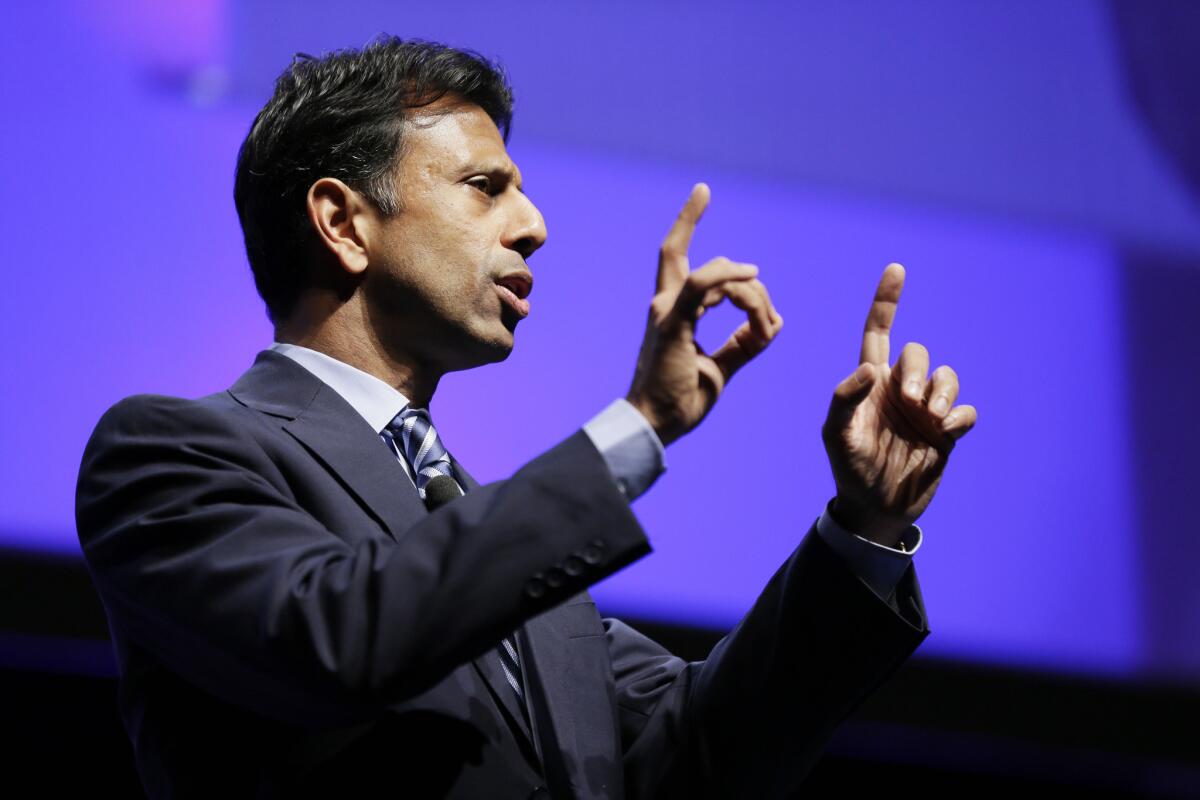Related story: Gov. Jindal pushes oil and coal use, rejects climate change rules

- Share via
Reporting from Washington — Louisiana Gov. Bobby Jindal, who hopes to use detailed position papers to build a bid for the Republican presidential nomination, released an energy plan Tuesday that calls for expanded oil and gas production and reversing the Obama administration’s efforts against climate change.
In a potentially crowded field of Republican hopefuls, Jindal has chosen two ways to try to distinguish himself, as an unstinting conservative, and, among the conservatives, as the candidate with detailed ideas.
The energy plan is part of a series of heavily footnoted, glossy papers on major issues that he has begun rolling out to back up those claims.
Earlier this year, Jindal unveiled a health plan that called for repealing President Obama’s health law and replacing it with a $100 billion fund for state insurance plans to cover people with pre-existing medical conditions. He also recently went to court to challenge the Common Core curriculum standards, a cause embraced by many conservative activists.
Jindal’s 44-page energy plan, unveiled initially at a breakfast for Washington reporters sponsored by the Christian Science Monitor, includes a number of planks that virtually all Republicans agree on -- approval of the Keystone Pipeline from Canada to the Gulf Coast, for example, and eliminating “burdensome regulations.”
But Jindal’s plan goes further than most in laying out details that sharply contrast with the positions taken by the Obama administration and most Democrats.
His plan calls for opening more off-shore waters to drilling, for example, although he left unsaid whether he would push for opening waters off Florida and California that state opposition has kept off-limits. He also would phase out tax advantages for wind power, ethanol and other renewable fuels.
But the clearest contrast comes on climate change. The administration earlier this year proposed a broad-ranging policy to reduce the emissions of carbon dioxide from the nation’s power plants, which account for about 40% of the gases that contribute to global warming.
Jindal would repeal the administration’s power plant proposal, which he argues will hurt the economy. He would also try to overturn the Supreme Court’s 2007 decision that forms the legal basis for regulating greenhouse gases. And he would withdraw the U.S. from the current international negotiations on climate change.
Instead, Jindal would back further research and propose relatively small-scale efforts that he calls “no-regrets policies” to combat climate change. His plan cites improving the management of national forests to reduce large-scale fires and upgrading air traffic control to improve the fuel efficiency of airlines as two examples.
“Let the scientists decide the underlying facts,” Jindal said at the breakfast, adding that he accepts the idea that human activities are causing some amount of global climate change, but “the real question is how much.”
Regardless of the answer to that question, he said, he opposes measures to reduce the amount of coal or other fossil fuels that the U.S. consumes unless China, India and other developing countries agree ahead of time to make similar reductions. Otherwise, he said, the U.S. will simply export jobs, as well as coal, to other countries.
Pressed on another scientific topic, Jindal declined to say whether he accepts evolution as the explanation of how complex life forms arose. “What I believe as a husband and a father is that local schools should make decisions” about what to teach, he said.
For more news on politics and policy, follow @DavidLauter on Twitter.
More to Read
Sign up for Essential California
The most important California stories and recommendations in your inbox every morning.
You may occasionally receive promotional content from the Los Angeles Times.














